Share
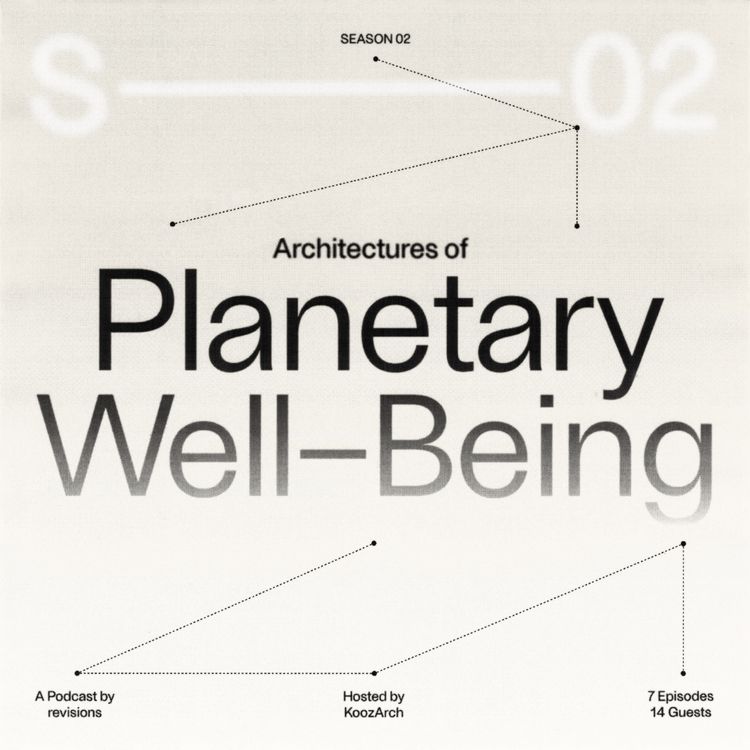
architectures of planetary well-being Podcast
Fictionalising Ecology with Lawrence Lek and Leah Wulfman
Season 2, Ep. 5
•
Architect, media artist, and educator Leah Wulfman and artist, filmmaker, and musician Lawrence Lek each found their way to architecture through an interest in world-building. Today, they both continue to create digital universes. In this episode, they discuss their educational histories, the material connection between the digital and physical worlds—the often detrimental environmental impact of technology on our planet; the way humanity, even its emotions, shapes virtual reality—and how exploring both realms with curiosity and care can lead to a more sustainable future.
More episodes
View all episodes
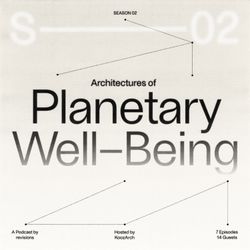
4. Curating in Public with Ekow Eshun and Danielle Dean
59:40||Season 2, Ep. 4“There’s two professions in the world that have at their heart some form of liberty… a philosopher and an artist,” says writer and curator Ekow Eshun. In a conversation with the interdisciplinary artist Danielle Dean, the two discuss the importance of storytelling and art in creating a more just and caring world. They reimagine the role of cultural institutions, particularly museums, and think beyond the confines of these spaces’ walls to imagine how we can utilize art to reevaluate history, establish new perspectives, and perhaps shape the future.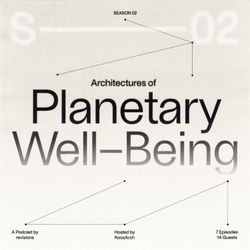
7. Informalising Information with Federica Fragapane and Sabba Khan
39:36||Season 2, Ep. 7While graphic novelist and architectural designer Sabba Khan’s work poignantly explores her own history growing up in East London, and Federica Fragapane uses painterly illustration to visualize data, in this conversation, they find the overlaps between their respective practices, and discuss the lived experiences and choices shaping even the most objective information. They remind us to use our own voices to help build the future, and frame their work as invitations—for readers to understand, relate to, and find themselves within it—and consider how all data is embodied by the people who comprise it.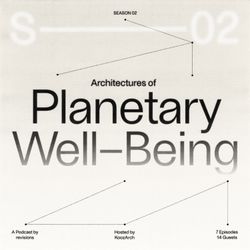
2. Identity and Ancestral Wisdom with Natasha Ginwala and Sumayya Vally
55:31||Season 2, Ep. 2How does water carry ancestral memory? And how can ancestral memory remind us of the wisdom we’ve always carried? Curator and writer Natasha Ginwala and architect Sumayya Vally examine questions like these in a profoundly tender conversation that touches on both practitioners’ recent work, as well as landscape, memory, the importance of what Natasha describes as a “unity of knowledge,” and how the desegregation of knowledge systems will ultimately unify us, too.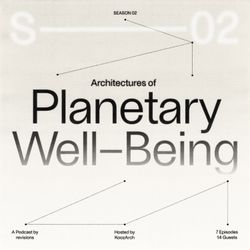
6. Decolonising Landscapes with Samia Henni and Noura Al-Sayeh
53:34||Season 2, Ep. 6In this episode, the Palestinian architect Noura Al Sayeh and the writer, historian, and architect Samia Henni discuss their recent accomplishments and, more broadly, the widespread impact of colonialism and imperialism—on both western perceptions of the world and its geographies, and on the artistic institutions that purport to fight hegemonic power structures. In an emotional, hopeful conversation, they reflect on the meaning of and need for decolonization—in the architectural field and everywhere else—how the siege on Gaza has led to a shift in our collective moral compass, and their genuine optimism for the future.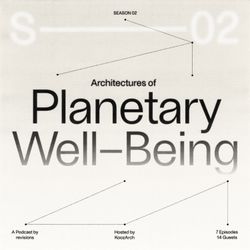
Introduction: Season 2 with Shumi Bose and Federica Zambeletti of KoozArch
25:28||Season 2, Ep. 0Welcome to Between Us, the second season of the Architectures of Planetary Well-Being podcast. For our first episode, we speak to the curators for this season, Shumi Bose and Federica Zambeletti of KoozArch, a research studio and digital magazine exploring architecture and design. Shumi and Federica guided the conversations of Season Two through the lens of betweenness—bridging gaps between practitioners and disciplines; moving collaboratively between spaces, concepts, and worlds. In this introductory episode, they reflect on the unexpected connections that emerged during the conversations for Between Us, and the generosity and sense of collaboration required to create architectures of planetary well-being.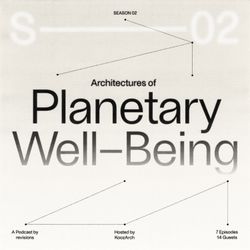
1. Representing Reparations with Emanuel Admassu and Setareh Noorani
59:24||Season 2, Ep. 1Researcher and architect Setareh Noorani and artist and architect Emanuel Admassu discuss the transformative power of friendship, collaboration, and, as Setareh says, being “in touch with each other.” Together, they explore how that same sense of horizontality might shape the concept of reparations—all the while considering the importance of accountability, of reframing the hegemonic hierarchies that still govern so much of our world, and of caring for ourselves and each other while working toward collective liberation.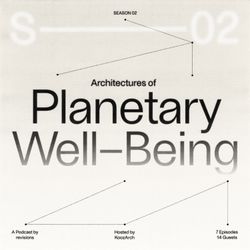
3. Designing (for) Biodiversity with Nzinga Biegueng Mboup and Seetal Solanki
38:28||Season 2, Ep. 3“What happens on Earth stays on Earth”: This Kendrick Lamar lyric unexpectedly grounds a conversation on sustainability and embodiment between architect Nzinga Biegueng Mboup and designer Seetal Solanki. The two find common ground in the multiplicity of their respective backgrounds and their shared love for materials; together they discuss the surprising fluidity of architectural materials, how a material’s locality can teach us about sustainability, and how we might reacquaint ourselves with the indigenous knowledge systems of the landscapes in which we build and live.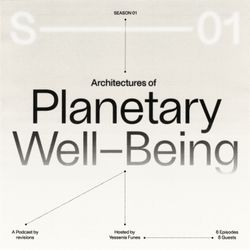
7. Moving Policy Through Storytelling with Vic Barrett
41:03||Season 1, Ep. 7The Architectures of Planetary Well-being podcast Season 1 is hosted by Yessenia Funes and produced by re:arc institute. In this episode, host Yessenia Funes welcomes climate justice activist Vic Barrett to discuss Moving Policy Through Storytelling. Vic Barrett is most known as a plaintiff in Juliana v. United States, a climate-related lawsuit filed in 2015 by 21 youth plaintiffs against the United States government. He has spoken at the People’s Climate March, the NYC Climate Strike, the American Museum of Natural History, the Brooklyn Museum, the United Nations, and the UNFCCC Conference of the Parties (COP). Join us as we explore how we can shape policy with concepts of empathy and care, take a look back at Vic’s beginnings as a youth activist, and talk about the significance of lived experience and embodied knowledge when advocating for climate justice.